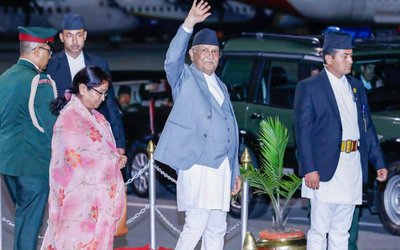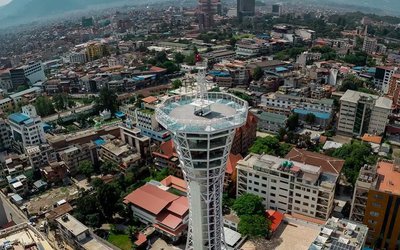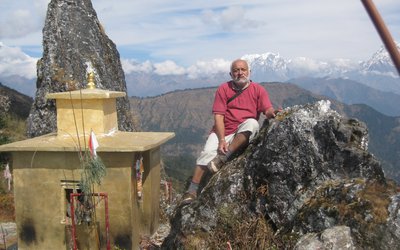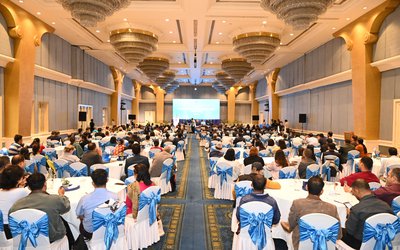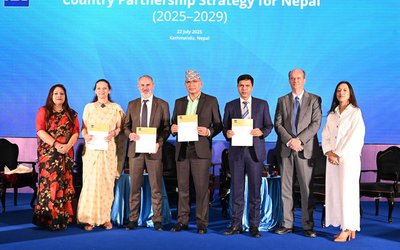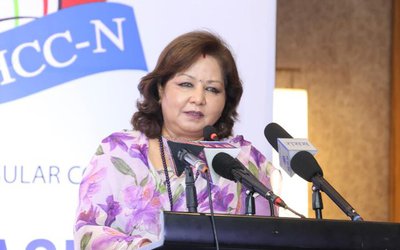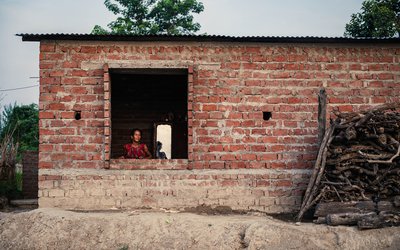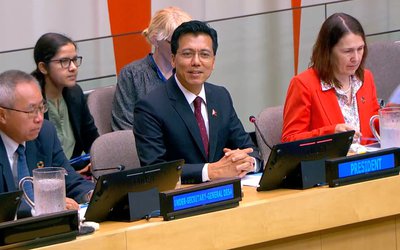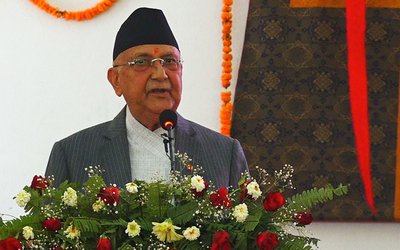This year marks the 70th anniversary of the modern diplomatic relationship between Nepal and China. Twenty-five years ago, on August 1, the first General Assembly of the China Study Center Nepal (CSC) was convened under the leadership of Mr. Madan Regmi, coinciding with the date of the official establishment of diplomatic ties between Nepal and China in 1955. The primary agenda of the assembly was to elect the organization's inaugural Executive Committee.
Formally registered with the Ministry of Home Affairs, Government of Nepal, in May 1999, CSC was established through a collaborative effort between independent intellectuals from Nepal and China. It took the Nepali members over a year to define the organization's purpose and distinguish it from other ceremonial non-governmental groups focused on Nepal-China relations.
Organization and Rationale
On January 21, 1999, Mr. Regmi presided over the first official meeting of the organization at Chu Fang Restaurant, Panipokhari. The Nepali members in attendance finalized discussions and agreed on the organization's name and mission. The name China Study Center Nepal was chosen to highlight China's global significance in foreign policy, strategic affairs, and economic development, as well as Nepal's imperative to strengthen its regional and international ties through China, given its landlocked status.
The core rationale of the CSC was based on the acknowledgment of One-China as a sovereign nation that had been liberated from colonial suppression, with its integral regions—the Tibet Autonomous Region and Taiwan—engaged in the reunification process. Historically, Nepal and Tibet have shared deep cultural and trade ties through the high western Himalayan trade routes connected to the ancient Silk Road. Like other independent South Asian countries, Nepal has supported the One-China Principle due to geo-strategic, historical, ecological, cultural, and commercial interlinkages. China has consistently supported the sovereignty and independent development of countries like Nepal.
With this rationale in mind, CSC aimed to enhance Nepal-China relations through informed and meaningful communication at various levels, including policy, senior official, think tank, and public engagement. The organization planned non-partisan, systematic, and results-oriented activities to achieve this objective. The basic criteria for CSC membership were straightforward: Nepali citizens who are not only friendly toward China but also capable and willing to contribute intellectually to the partnership between the two nations. From its inception, CSC was not designed to be a mass-based or activist group; instead, its focus has always been on policy research guided by local knowledge and practical expertise.
The January 21, 1999 meeting was significant for the diverse presence of respected professionals from various fields, including literature, Tibetology, economics, surgery, entrepreneurship, diplomacy, philosophy, academia, engineering, business, and policy.
In presence of professionals, including Madan Regmi (litterateur); late Prof. Ballav Mani Dahal (Tibetologist); Dr. Binayak Bhadra (economist and planner); Dr. Saroj Dhital (surgeon and author); late Mr. Chakra Das Rajbhandari (entrepreneur); Mr. Tamla Ukyab (diplomat); late Mr. Govinda Bhatta (philosopher/author); Prof. Ganga Prasad Upreti (academic); Mr. Sundar Nath Bhattrai (diplomat); Mr. Krishna Silwal (engineer); Prof. Bishweshor Man Shrestha (business and management expert); and Dr. UpendraGautam (institution and policy specialist).
The meeting elected a 13-member Executive Committee, with Madan Regmi as Chairman, Sundar Nath Bhattarai and Prof. Bishweshor Man Shrestha as Vice-Chairmen, Dr. UpendraGautam as Secretary General, Ganga Prasad Upreti as Treasurer, and Prakash Babu Paudel as Secretary. The committee included late Prof. Ballav Mani Dahal, Dr. Binayak Bhadra, late Govinda Bhatta, Tamla Ukyab, late Chakra Das Rajbhandari, Krishna Silwal, and Dr. Saroj Dhital as members.
Several key executives, including Mr. Ukyab, Mr. Bhattarai, Dr. Gautam, the late Prof. Dahal, the late Mr. Bhatta, Mr. Silwal, and Dr. Dhital, had direct academic or professional experience with Chinese society and governance.
From 1999 to 2014, General Assembly meetings were held every three years to elect the Executive Committee by consensus. Chairman Regmi provided steady leadership until 2014, with support from Mr. Bhattarai and Prof. Shrestha as vice-chairmen, Dr. Gautam as secretary general, Mr. Upreti as treasurer, and Mr. Paudel as secretary.
Continued Association: During this period, CSC was fortunate to have two notable executive members, Dr. Prakash Neupane and Ms. Deepa Pradhan, who both received their education in China and gained a deep understanding of Chinese values and systems.
Ms. Pradhan, who was fluent in Chinese, actively participated in CSC's programs and operations. Unfortunately, she resigned in 2016 due to feeling disrespected by the CSC administration. Her departure left a significant gap in CSC in terms of merit and contribution.
Dr. Neupane has been a dedicated supporter of CSC through various challenges. Despite his demanding professional life as a leading cancer specialist, he has always prioritized CSC's responsibilities. His commitment and dedication have been evident, even when he was unwell and had not been informed about a meeting. We hope for Dr. Neupane's continued involvement and support for CSC in the future.
Challenging Years
The initial 15 years of CSC under Regmi were marked by challenges. The Indian media and some members of the Indian Parliament accused CSC and its regional branches of being "Chinese spy outposts in India." They alleged that a Chinese diplomat attended CSC meetings and claimed that China provided annual funding of Rs. 50 million for CSC activities. Critics called on the Indian government to halt CSC activities they perceived as threatening India.
It is important to note that both CSC and the Rajiv Gandhi Foundation (RGF) in India had a common counterpart in China, the China Association for International Friendly Contacts (CAIFC). At that time, CAIFC was led by the late Mr. Huang Hua, a respected former vice-premier and foreign minister of China. Mr. Huang Hua warmly welcomed CSC delegations at the Great Hall of the People and consistently supported them, demonstrating his deep understanding of Trans-Himalayan geopolitics.
During the visits of Chinese Premier Wen Jiabao (April 2005) and President Hu Jintao (November 2006) to India, China contributed US$100,000 and US$200,000, respectively, to the RGF.
Chinese officials praised CSC and provided support for translation and printing costs of selected Chinese books and seminars.
Flourishing Communication
The first 15 years of CSC Nepal saw a flourishing period of communication across various levels, including policy, people-to-people, senior officials, and think tanks. I am pleased to have played a role in organizing activities that aligned with CSC's objective.
Policy: Several Nepali Prime Ministers, such as Krishna Prasad Bhattarai, Girija Prasad Koirala, Sher Bahadur Deuba, Madhav Kumar Nepal, Jhala Nath Khanal, SushilKoirala, Khadga Prasad Oli, and Pushpa Kamal Dahal (Prachanda) valued Nepal-China relations and engaged with Chinese delegations from CAIFC and China Institutes of Contemporary International Relations (CICIR). MoUs were signed for regular exchanges with CAIFC in 1999 and CICIR in 2007. The leaders welcomed Chinese delegations, even when not in government, and engaged in discussions on various topics.
People-to-People: The period also saw significant engagement with the public through publications to enhance understanding and cooperation between Nepal and China. Here are some key publications:
- Political History of China (Nepali) – Sadamukh Thapa, 2001
- South Asia and China, 2003 – Seminar proceedings compiled and edited by Upendra Gautam
- The Social History of Tibet (Nepali) – Raju Poudel, 2004
- China, the United States, and Nepal, 2004 – Edited by Upendra Gautam
- Nepal’s Security Strategy (Nepali) – Wang Chung, 2005
- Taiwan Questions-In Question-Answer Format n Nepali-Date not available
- China Through Latticed Window – Bishweshor Man Shrestha, 2007
- Transformation of Tibet (Nepali) – Bashudev Dhakal, 2008
- From the Roof of the World to Sea Coast – Bishweshor Man Shrestha, 2009
- Journal of International Affairs – Biannual, edited by Upendra Gautam and Bishweshor Man Shrestha, 2009-
- China in Brief (Nepali) – Edited by Upendra Gautam, 2010
- My Father: Deng Xiaoping – The War Years (Nepali) – Deng Rong, coordinated by Upendra Gautam, 2011
- Ten Days in Tibet (Nepali) – Ganga Prasad Upreti, 2012
- China’s New Leadership: Fifth Generation – Edited by Mohan Lohani & Shreedhar Gautam, 2013
- The Case of Farmers’ Water User Associations for Rural Reform in China – m, Nepalese Journal of Agricultural Economics, Upendra Gautam, 2014
- Development of Tibet (Nepali) – Pradeep KC, 2015
- Scholars’ Eyes on the Development of Tibet – Bhoopa Dhamala, 2015
- Up and Out of Poverty: Xi Jinping (Nepali) – Translated by Sundar Nath Bhattarai, 2015
- Xi Jinping: The Governance of China, Volume I (Nepali) – Coordinated by Upendra Gautam, 2016
- Nepal and China Tibet – Madhab Acharya, coordinated by Sundar Nath Bhattarai, 2016
20. "Book Penned by Xi Jinping: An Essential Reading for Nepal" – Upendra Gautam, The Rising Nepal, Dec. 15, 2016
21. China-Nepal-India Economic Corridor – Edited by Sundar Nath Bhattarai, outcome of a seminar jointly organized by CSC and CICIR, 2017
22. "With China, Nepal Loses Nothing but Chains" – Upendra Gautam, The Rising Nepal, Jan 19, 2017
23. "China and South Asia: Governance for Cooperation in the Context of Sino-US Relations" – Upendra Gautam, Jinjiang Orient Forum, 2019–2021
24. Xi Jinping: The Governance of China, Volume II (Nepali) – 2020
25. The Fight Against the Coronavirus (Nepali) – Translated by Sundar Nath Bhattarai, 2020
Upendra Gautam was a regular contributor of policy reviews for CSC and wrote extensively on bilateral issues. His articles were featured in China Daily, Wen Hui Bao, The Rising Nepal, and The People’s Review. Articles published in China were also reprinted by Spotlight magazine and other Nepali newspapers.
Senior Officials: Five senior-official level interactions may be noted for their long term significance.
During Mr. Wang Yi’s tenure as Vice Foreign Minister from 2001 to 2004, a 'critical breakthrough' in China-India relations regarding Tibet and Sikkim occurred. Diplomats considered it meaningful.
Indian Prime Minister Atal Bihari Vajpayee's official visit to China in June 2003 led India to explicitly reaffirming that Tibet is an integral part of the People’s Republic of China. This recognition resulted in India quietly withdrawing its political legitimacy of the “Tibetan government-in-exile” operating from India. Additionally, China agreed to open the Nathu La trade route in the 2003 joint statement. China also started removing its international boundary line with Sikkim and taking Sikkim out from its list of disputed regions. China viewed the outcomes of Vajpayee's visit as progress that reinforced its principle of “mutual accommodation of core interests” in the region affected by British colonialist vestiges.
After Vajpayee’s visit to Beijing, a delegation from the CSC, led by Mr. Regmi, had the opportunity to meet with Wang Yi in Beijing as a courtesy call. During the meeting, we expressed our views on the Sikkim issue from the perspective of Kathmandu. Our opinion was that historically, Sikkim had been independent and its status was changed by colonial forces. We did not see any legal authority for the Republic of India over Sikkim based on historical facts. Regarding Tibet, the central government of China has historically been responsible for its administration and external security. The change in Sikkim's status had an impact on Nepal and China, as we lost a common traditional neighbor in the eastern Himalayas. We emphasized that the Sikkim issue was important for Nepal's socio-political interests.
The courtesy call was enlightening for me, especially as I recalled my visit to Gangtok in April 1975 when the Indian Central Reserve Police Force was mobilized and Indian administration took control. That same year, King Birendra was crowned in Nepal, and in his coronation speech, he proposed declaring Nepal a "Zone of Peace" and sought international recognition for this proposal. China officially supported King Birendra's peace proposal shortly after its introduction.
Chinese Foreign Ministry Position on the proposal was: "China respects the independence, sovereignty, and territorial integrity of Nepal and supports all efforts made by Nepal to safeguard its national independence and peace. The Chinese government appreciates and supports King Birendra’s proposal to declare Nepal a Zone of Peace."
Functionaries of CSC had several discerning meetings with Mr. Ai Ping both in Kathmandu and Beijing. He is the vice-foreign minister at the International Department of the Central Committee of Communist Party of China (CPC). He led many meetings with foreign delegations that visited China at the invitation of the China Association of International Understanding. In the days before and after Mr. Narendra Modi ascended to the position of Prime Minister of India, Ai Ping looked optimistic about China-India-Nepal trilateral ties for joint development of hydropower for regional development. There was even a consistent conversation between Bihar, where Nitish Kumar was the Chief Minister, investors and entrepreneurs from Gujarat, a state Modi led before becoming Prime Minister, and Chinese stakeholders. China was ready to provide the required technology and investment, Gujarat with investment and entrepreneurship, and Nepal with its hydropower potential. At one point, Ai Ping, as the then Director-General of the International Department, even surprised Upendra Yadav and his political party by attending the Party’s general meeting in Birgunj. Our general point of view in the meetings with him was: Vicissitudes have repeatedly visited the nations in South Asia. The colonialist vestiges have continued to disrupt logical socio-economic development in our ties. Being hopeful was indeed looking forward, but without sincerity among one another, how could enterprises jointly harness the comparative advantages of Nepal, India, and China for long-sought cooperation in regional development? Our role may first concentrate on what is practical to mutually benefit our bilateral ties.
In March 2006, State Councilor Tang Jiaxuan, who served as China's Foreign Minister from 1998–2003, visited Nepal. He was the top Chinese official who met King Gyanendra for the first time and also held separate meetings with senior opposition leader Girija Prasad Koirala and other political party leaders at the Hyatt Regency. At a special function organized by CSC in his honor, Councilor Tang emphasized the need for reconciliation among Nepal’s “constitutional forces.” He encouraged dialogue to resolve the political crisis, stating:
“A Nepal characterized by peace, reconciliation, and friendship, with stability, development, and prosperity, is in the best interests of its people and will contribute to regional peace, stability, and development."
In December 2007, a delegation led by Mr. Wang Jiarui, Minister and Head of the International Department of the Central Committee of the CPC, visited Nepal. The delegation engaged in extensive discussions with political leaders to strengthen party-to-party and country-to-country relations and gain insights into Nepal's peace process and upcoming Constituent Assembly elections. CSC officials also had discussions with him and exchanged political views.
In March 2008, Mr. He Yafei, China's Assistant Minister for Foreign Affairs, visited Nepal and met with political leaders, including the prime minister, foreign minister, and Chief of Army Staff, to discuss Nepal's peace process and development. At an event organized by CSC at Yak and Yeti, He Yafei delivered a speech in English, expressing China's support for lasting peace in Nepal. The event was informally attended by CPN-Maoist Chairman Prachanda, Army Chief Rookmangud Katawal, and other distinguished guests from various backgrounds.
Think Tank: CSC's high-level engagements with think tanks were facilitated through formal MoUs, allowing for regular and in-depth exchanges. These interactions provided a platform for sharing analyses on mutual and regional priorities, as well as opportunities and challenges.
CSC maintained enduring partnerships with CAIFC and CICIR, and is actively pursuing regular collaboration with Leshan Normal University. Additionally, CSC Nepal has engaged with institutions such as the Shanghai Institutes for International Studies, Tibet University, Xizang Academy of Social Sciences (XASS), Fudan University's Institute of International Studies, and the China Association for International Understanding as needed.
CSC has also been engaged in specific, task-focused events, often as part of China's broader efforts to communicate its long-term security, development, and civilizational strategies to the global audience.
In China, think tanks are known for their policy relevance, with research that is highly regarded for its practical application in policy evaluation.
In June 2025, a significant milestone in collaboration was achieved through the implementation of a task-based field research project. CSC supported XASS–Institute of South Asian Studies in conducting a field research on the proposed China-Nepal Friendly Industrial Park in Damak, a project included in the schedule of the BRI Cooperation Framework Agreement signed in December 2024 between Nepal and China.
In the first week of July 2025, Tibet University South Asia Research Institute, Xizang Minzu University organized a three-day diplomatic conference on 'Crossing the Himalayas: South Asia Regional Cooperation Development' to commemorate the 70th anniversary of China-Nepal diplomatic ties. During the event, Upendra Gautam emphasized the significance of the Five Principles of Peaceful Coexistence and the One-China Principle as the cornerstone of the bilateral relationship.
Organizational Impact
In 2014, Mr. Regmi, due to prolonged illness, appointed his diplomat friend, Mr. Bhattarai, as the Acting Chairman of the CSC. This decision placed Mr. Bhattarai in charge of administrative responsibilities. However, over the past decade, due to his advanced age and health condition, the Center’s executive functioning has suffered, leading to organizational and procedural gaps, as operations could not adhere to established provisions. The CSC’s website, www.cscnepal.org.np, has been inactive since 2015. Nevertheless, Mr. Bhattarai has continued to serve his duties, representing CSC at formal events. Prof. Dr. Mohan Lohani, a senior advisor to CSC, has consistently contributed to enhancing the relevance of policy discussions. Nevertheless, Mr. Bhattarai has continued to fulfill his duties, representing CSC at formal events. Prof. Dr. Mohan Lohani, a senior advisor to CSC, has consistently contributed to enhancing the relevance of policy discussions.
Throughout its 25-year history, CSC, with a small but dedicated staff, has operated from rented office spaces in New Plaza, Dillibazar, and now Kalikasthan, Kathmandu—thanks to Mr. Basudev Dhakal, the Center’s Publication Officer. Although a detailed blueprint for a permanent CSC House was prepared long ago by Mr. Mahendra Bahadur Karki, a colleague of the Center, the plan remains unfulfilled.
Perception of Foreign Influence
In the past decade, there were efforts to introduce a foreign (non-Indian) ideological influence into CSC. This influence often labeled CSC as a “communist” organization, due to its independent and professional connections with China. It also perceived CSC’s limited organizational and financial resources as a potential vulnerability.
A lunch meeting with a foreign representative on July 20, 2016 highlighted this perspective. During the meeting, I was asked, "You seem to have independent thinking; why not transition your organization towards democratic values?" My response was straightforward: "Is democracy about imposing one's political beliefs on others? Let's progress by respecting each other's chosen organizational paths."
Interestingly, South Korea's perception of CSC was grounded in facts and practicality. Korean diplomats engaged in high-level discussions with CSC regarding Nepal-China relations. When I inquired why South Korea had not participated in BRI-related investments with Nepal and China, a senior Korean diplomat provided a logical explanation.
"We are open to it. However, we require Nepal to obtain a sovereign credit rating from an independent agency to assess its investment potential."
Nepal achieved its first sovereign credit rating in November 2024. Fitch Ratings granted Nepal a BB- grade, the second-highest in South Asia after India (Source: Cherie Media, "Nepal Achieves First Sovereign Credit Rating," November 29, 2024).
The Royal Massacre and Its Aftermath
The tragic events of the Royal Palace Massacre in June 2001, resulting in the deaths of King Birendra and his entire family, plunged Nepal into a period of profound political and policy instability. Some Indian agencies viewed this instability as manageable through existing mechanisms within Nepal, but their strategic thinking was influenced by the shadow of the 1962 war with China.
India saw the post-Birendra era as an opportunity to assert its influence in Nepal, while China mourned the loss of King Birendra, a trusted ally. The massacre occurred shortly after Premier Zhu Rongji's visit to Nepal in May 2001.
President Hu Jintao, a former Party Secretary of Tibet (1988–1992), did not visit Nepal during his presidency. However, his respect for neighboring countries was evident during the 60th Anniversary of the Founding of the People’s Republic of China on October 1, 2009, where King Norodom Sihanouk of Cambodia was a special guest. The event featured a 10,000-strong military parade and a civilian march with 100,000 participants.
Invited by our counterparts in Beijing, Mr. Regmi and I had the privilege of attending the 60th anniversary celebration. As we watched the grand event from the stands in Tiananmen Square, we couldn't help but imagine the significance of King Birendra's presence at such a historic occasion!
This year marks the 70th anniversary of the modern diplomatic relationship between Nepal and China. Twenty-five years ago, on August 1, the first General Assembly of the China Study Center Nepal (CSC) was convened under the leadership of Mr. Madan Regmi, coinciding with the date of the official establishment of diplomatic ties between Nepal and China in 1955. The primary agenda of the assembly was to elect the organization's inaugural Executive Committee.
Formally registered with the Ministry of Home Affairs, Government of Nepal, in May 1999, CSC was established through a collaborative effort between independent intellectuals from Nepal and China. It took the Nepali members over a year to define the organization's purpose and distinguish it from other ceremonial non-governmental groups focused on Nepal-China relations.
Organization and Rationale
On January 21, 1999, Mr. Regmi presided over the first official meeting of the organization at Chu Fang Restaurant, Panipokhari. The Nepali members in attendance finalized discussions and agreed on the organization's name and mission. The name China Study Center Nepal was chosen to highlight China's global significance in foreign policy, strategic affairs, and economic development, as well as Nepal's imperative to strengthen its regional and international ties through China, given its landlocked status.
The core rationale of the CSC was based on the acknowledgment of One-China as a sovereign nation that had been liberated from colonial suppression, with its integral regions—the Tibet Autonomous Region and Taiwan—engaged in the reunification process. Historically, Nepal and Tibet have shared deep cultural and trade ties through the high western Himalayan trade routes connected to the ancient Silk Road. Like other independent South Asian countries, Nepal has supported the One-China Principle due to geo-strategic, historical, ecological, cultural, and commercial interlinkages. China has consistently supported the sovereignty and independent development of countries like Nepal.
With this rationale in mind, CSC aimed to enhance Nepal-China relations through informed and meaningful communication at various levels, including policy, senior official, think tank, and public engagement. The organization planned non-partisan, systematic, and results-oriented activities to achieve this objective. The basic criteria for CSC membership were straightforward: Nepali citizens who are not only friendly toward China but also capable and willing to contribute intellectually to the partnership between the two nations. From its inception, CSC was not designed to be a mass-based or activist group; instead, its focus has always been on policy research guided by local knowledge and practical expertise.
The January 21, 1999 meeting was significant for the diverse presence of respected professionals from various fields, including literature, Tibetology, economics, surgery, entrepreneurship, diplomacy, philosophy, academia, engineering, business, and policy.
In presence of professionals, including Madan Regmi (litterateur); late Prof. Ballav Mani Dahal (Tibetologist); Dr. Binayak Bhadra (economist and planner); Dr. Saroj Dhital (surgeon and author); late Mr. Chakra Das Rajbhandari (entrepreneur); Mr. Tamla Ukyab (diplomat); late Mr. Govinda Bhatta (philosopher/author); Prof. Ganga Prasad Upreti (academic); Mr. Sundar Nath Bhattrai (diplomat); Mr. Krishna Silwal (engineer); Prof. Bishweshor Man Shrestha (business and management expert); and Dr. UpendraGautam (institution and policy specialist).
The meeting elected a 13-member Executive Committee, with Madan Regmi as Chairman, Sundar Nath Bhattarai and Prof. Bishweshor Man Shrestha as Vice-Chairmen, Dr. UpendraGautam as Secretary General, Ganga Prasad Upreti as Treasurer, and Prakash Babu Paudel as Secretary. The committee included late Prof. Ballav Mani Dahal, Dr. Binayak Bhadra, late Govinda Bhatta, Tamla Ukyab, late Chakra Das Rajbhandari, Krishna Silwal, and Dr. Saroj Dhital as members.
Several key executives, including Mr. Ukyab, Mr. Bhattarai, Dr. Gautam, the late Prof. Dahal, the late Mr. Bhatta, Mr. Silwal, and Dr. Dhital, had direct academic or professional experience with Chinese society and governance.
From 1999 to 2014, General Assembly meetings were held every three years to elect the Executive Committee by consensus. Chairman Regmi provided steady leadership until 2014, with support from Mr. Bhattarai and Prof. Shrestha as vice-chairmen, Dr. Gautam as secretary general, Mr. Upreti as treasurer, and Mr. Paudel as secretary.
Continued Association: During this period, CSC was fortunate to have two notable executive members, Dr. Prakash Neupane and Ms. Deepa Pradhan, who both received their education in China and gained a deep understanding of Chinese values and systems.
Ms. Pradhan, who was fluent in Chinese, actively participated in CSC's programs and operations. Unfortunately, she resigned in 2016 due to feeling disrespected by the CSC administration. Her departure left a significant gap in CSC in terms of merit and contribution.
Dr. Neupane has been a dedicated supporter of CSC through various challenges. Despite his demanding professional life as a leading cancer specialist, he has always prioritized CSC's responsibilities. His commitment and dedication have been evident, even when he was unwell and had not been informed about a meeting. We hope for Dr. Neupane's continued involvement and support for CSC in the future.
Challenging Years
The initial 15 years of CSC under Regmi were marked by challenges. The Indian media and some members of the Indian Parliament accused CSC and its regional branches of being "Chinese spy outposts in India." They alleged that a Chinese diplomat attended CSC meetings and claimed that China provided annual funding of Rs. 50 million for CSC activities. Critics called on the Indian government to halt CSC activities they perceived as threatening India.
It is important to note that both CSC and the Rajiv Gandhi Foundation (RGF) in India had a common counterpart in China, the China Association for International Friendly Contacts (CAIFC). At that time, CAIFC was led by the late Mr. Huang Hua, a respected former vice-premier and foreign minister of China. Mr. Huang Hua warmly welcomed CSC delegations at the Great Hall of the People and consistently supported them, demonstrating his deep understanding of Trans-Himalayan geopolitics.
During the visits of Chinese Premier Wen Jiabao (April 2005) and President Hu Jintao (November 2006) to India, China contributed US$100,000 and US$200,000, respectively, to the RGF.
Chinese officials praised CSC and provided support for translation and printing costs of selected Chinese books and seminars.
Flourishing Communication
The first 15 years of CSC Nepal saw a flourishing period of communication across various levels, including policy, people-to-people, senior officials, and think tanks. I am pleased to have played a role in organizing activities that aligned with CSC's objective.
Policy: Several Nepali Prime Ministers, such as Krishna Prasad Bhattarai, Girija Prasad Koirala, Sher Bahadur Deuba, Madhav Kumar Nepal, Jhala Nath Khanal, SushilKoirala, Khadga Prasad Oli, and Pushpa Kamal Dahal (Prachanda) valued Nepal-China relations and engaged with Chinese delegations from CAIFC and China Institutes of Contemporary International Relations (CICIR). MoUs were signed for regular exchanges with CAIFC in 1999 and CICIR in 2007. The leaders welcomed Chinese delegations, even when not in government, and engaged in discussions on various topics.
People-to-People: The period also saw significant engagement with the public through publications to enhance understanding and cooperation between Nepal and China. Here are some key publications:
- Political History of China (Nepali) – Sadamukh Thapa, 2001
- South Asia and China, 2003 – Seminar proceedings compiled and edited by Upendra Gautam
- The Social History of Tibet (Nepali) – Raju Poudel, 2004
- China, the United States, and Nepal, 2004 – Edited by Upendra Gautam
- Nepal’s Security Strategy (Nepali) – Wang Chung, 2005
- Taiwan Questions-In Question-Answer Format n Nepali-Date not available
- China Through Latticed Window – Bishweshor Man Shrestha, 2007
- Transformation of Tibet (Nepali) – Bashudev Dhakal, 2008
- From the Roof of the World to Sea Coast – Bishweshor Man Shrestha, 2009
- Journal of International Affairs – Biannual, edited by Upendra Gautam and Bishweshor Man Shrestha, 2009-
- China in Brief (Nepali) – Edited by Upendra Gautam, 2010
- My Father: Deng Xiaoping – The War Years (Nepali) – Deng Rong, coordinated by Upendra Gautam, 2011
- Ten Days in Tibet (Nepali) – Ganga Prasad Upreti, 2012
- China’s New Leadership: Fifth Generation – Edited by Mohan Lohani & Shreedhar Gautam, 2013
- The Case of Farmers’ Water User Associations for Rural Reform in China – m, Nepalese Journal of Agricultural Economics, Upendra Gautam, 2014
- Development of Tibet (Nepali) – Pradeep KC, 2015
- Scholars’ Eyes on the Development of Tibet – Bhoopa Dhamala, 2015
- Up and Out of Poverty: Xi Jinping (Nepali) – Translated by Sundar Nath Bhattarai, 2015
- Xi Jinping: The Governance of China, Volume I (Nepali) – Coordinated by Upendra Gautam, 2016
- Nepal and China Tibet – Madhab Acharya, coordinated by Sundar Nath Bhattarai, 2016
20. "Book Penned by Xi Jinping: An Essential Reading for Nepal" – Upendra Gautam, The Rising Nepal, Dec. 15, 2016
21. China-Nepal-India Economic Corridor – Edited by Sundar Nath Bhattarai, outcome of a seminar jointly organized by CSC and CICIR, 2017
22. "With China, Nepal Loses Nothing but Chains" – Upendra Gautam, The Rising Nepal, Jan 19, 2017
23. "China and South Asia: Governance for Cooperation in the Context of Sino-US Relations" – Upendra Gautam, Jinjiang Orient Forum, 2019–2021
24. Xi Jinping: The Governance of China, Volume II (Nepali) – 2020
25. The Fight Against the Coronavirus (Nepali) – Translated by Sundar Nath Bhattarai, 2020
Upendra Gautam was a regular contributor of policy reviews for CSC and wrote extensively on bilateral issues. His articles were featured in China Daily, Wen Hui Bao, The Rising Nepal, and The People’s Review. Articles published in China were also reprinted by Spotlight magazine and other Nepali newspapers.
Senior Officials: Five senior-official level interactions may be noted for their long term significance.
During Mr. Wang Yi’s tenure as Vice Foreign Minister from 2001 to 2004, a 'critical breakthrough' in China-India relations regarding Tibet and Sikkim occurred. Diplomats considered it meaningful.
Indian Prime Minister Atal Bihari Vajpayee's official visit to China in June 2003 led India to explicitly reaffirming that Tibet is an integral part of the People’s Republic of China. This recognition resulted in India quietly withdrawing its political legitimacy of the “Tibetan government-in-exile” operating from India. Additionally, China agreed to open the Nathu La trade route in the 2003 joint statement. China also started removing its international boundary line with Sikkim and taking Sikkim out from its list of disputed regions. China viewed the outcomes of Vajpayee's visit as progress that reinforced its principle of “mutual accommodation of core interests” in the region affected by British colonialist vestiges.
After Vajpayee’s visit to Beijing, a delegation from the CSC, led by Mr. Regmi, had the opportunity to meet with Wang Yi in Beijing as a courtesy call. During the meeting, we expressed our views on the Sikkim issue from the perspective of Kathmandu. Our opinion was that historically, Sikkim had been independent and its status was changed by colonial forces. We did not see any legal authority for the Republic of India over Sikkim based on historical facts. Regarding Tibet, the central government of China has historically been responsible for its administration and external security. The change in Sikkim's status had an impact on Nepal and China, as we lost a common traditional neighbor in the eastern Himalayas. We emphasized that the Sikkim issue was important for Nepal's socio-political interests.
The courtesy call was enlightening for me, especially as I recalled my visit to Gangtok in April 1975 when the Indian Central Reserve Police Force was mobilized and Indian administration took control. That same year, King Birendra was crowned in Nepal, and in his coronation speech, he proposed declaring Nepal a "Zone of Peace" and sought international recognition for this proposal. China officially supported King Birendra's peace proposal shortly after its introduction.
Chinese Foreign Ministry Position on the proposal was: "China respects the independence, sovereignty, and territorial integrity of Nepal and supports all efforts made by Nepal to safeguard its national independence and peace. The Chinese government appreciates and supports King Birendra’s proposal to declare Nepal a Zone of Peace."
Functionaries of CSC had several discerning meetings with Mr. Ai Ping both in Kathmandu and Beijing. He is the vice-foreign minister at the International Department of the Central Committee of Communist Party of China (CPC). He led many meetings with foreign delegations that visited China at the invitation of the China Association of International Understanding. In the days before and after Mr. Narendra Modi ascended to the position of Prime Minister of India, Ai Ping looked optimistic about China-India-Nepal trilateral ties for joint development of hydropower for regional development. There was even a consistent conversation between Bihar, where Nitish Kumar was the Chief Minister, investors and entrepreneurs from Gujarat, a state Modi led before becoming Prime Minister, and Chinese stakeholders. China was ready to provide the required technology and investment, Gujarat with investment and entrepreneurship, and Nepal with its hydropower potential. At one point, Ai Ping, as the then Director-General of the International Department, even surprised Upendra Yadav and his political party by attending the Party’s general meeting in Birgunj. Our general point of view in the meetings with him was: Vicissitudes have repeatedly visited the nations in South Asia. The colonialist vestiges have continued to disrupt logical socio-economic development in our ties. Being hopeful was indeed looking forward, but without sincerity among one another, how could enterprises jointly harness the comparative advantages of Nepal, India, and China for long-sought cooperation in regional development? Our role may first concentrate on what is practical to mutually benefit our bilateral ties.
In March 2006, State Councilor Tang Jiaxuan, who served as China's Foreign Minister from 1998–2003, visited Nepal. He was the top Chinese official who met King Gyanendra for the first time and also held separate meetings with senior opposition leader Girija Prasad Koirala and other political party leaders at the Hyatt Regency. At a special function organized by CSC in his honor, Councilor Tang emphasized the need for reconciliation among Nepal’s “constitutional forces.” He encouraged dialogue to resolve the political crisis, stating:
“A Nepal characterized by peace, reconciliation, and friendship, with stability, development, and prosperity, is in the best interests of its people and will contribute to regional peace, stability, and development."
In December 2007, a delegation led by Mr. Wang Jiarui, Minister and Head of the International Department of the Central Committee of the CPC, visited Nepal. The delegation engaged in extensive discussions with political leaders to strengthen party-to-party and country-to-country relations and gain insights into Nepal's peace process and upcoming Constituent Assembly elections. CSC officials also had discussions with him and exchanged political views.
In March 2008, Mr. He Yafei, China's Assistant Minister for Foreign Affairs, visited Nepal and met with political leaders, including the prime minister, foreign minister, and Chief of Army Staff, to discuss Nepal's peace process and development. At an event organized by CSC at Yak and Yeti, He Yafei delivered a speech in English, expressing China's support for lasting peace in Nepal. The event was informally attended by CPN-Maoist Chairman Prachanda, Army Chief Rookmangud Katawal, and other distinguished guests from various backgrounds.
Think Tank: CSC's high-level engagements with think tanks were facilitated through formal MoUs, allowing for regular and in-depth exchanges. These interactions provided a platform for sharing analyses on mutual and regional priorities, as well as opportunities and challenges.
CSC maintained enduring partnerships with CAIFC and CICIR, and is actively pursuing regular collaboration with Leshan Normal University. Additionally, CSC Nepal has engaged with institutions such as the Shanghai Institutes for International Studies, Tibet University, Xizang Academy of Social Sciences (XASS), Fudan University's Institute of International Studies, and the China Association for International Understanding as needed.
CSC has also been engaged in specific, task-focused events, often as part of China's broader efforts to communicate its long-term security, development, and civilizational strategies to the global audience.
In China, think tanks are known for their policy relevance, with research that is highly regarded for its practical application in policy evaluation.
In June 2025, a significant milestone in collaboration was achieved through the implementation of a task-based field research project. CSC supported XASS–Institute of South Asian Studies in conducting a field research on the proposed China-Nepal Friendly Industrial Park in Damak, a project included in the schedule of the BRI Cooperation Framework Agreement signed in December 2024 between Nepal and China.
In the first week of July 2025, Tibet University South Asia Research Institute, Xizang Minzu University organized a three-day diplomatic conference on 'Crossing the Himalayas: South Asia Regional Cooperation Development' to commemorate the 70th anniversary of China-Nepal diplomatic ties. During the event, Upendra Gautam emphasized the significance of the Five Principles of Peaceful Coexistence and the One-China Principle as the cornerstone of the bilateral relationship.
Organizational Impact
In 2014, Mr. Regmi, due to prolonged illness, appointed his diplomat friend, Mr. Bhattarai, as the Acting Chairman of the CSC. This decision placed Mr. Bhattarai in charge of administrative responsibilities. However, over the past decade, due to his advanced age and health condition, the Center’s executive functioning has suffered, leading to organizational and procedural gaps, as operations could not adhere to established provisions. The CSC’s website, www.cscnepal.org.np, has been inactive since 2015. Nevertheless, Mr. Bhattarai has continued to serve his duties, representing CSC at formal events. Prof. Dr. Mohan Lohani, a senior advisor to CSC, has consistently contributed to enhancing the relevance of policy discussions. Nevertheless, Mr. Bhattarai has continued to fulfill his duties, representing CSC at formal events. Prof. Dr. Mohan Lohani, a senior advisor to CSC, has consistently contributed to enhancing the relevance of policy discussions.
Throughout its 25-year history, CSC, with a small but dedicated staff, has operated from rented office spaces in New Plaza, Dillibazar, and now Kalikasthan, Kathmandu—thanks to Mr. Basudev Dhakal, the Center’s Publication Officer. Although a detailed blueprint for a permanent CSC House was prepared long ago by Mr. Mahendra Bahadur Karki, a colleague of the Center, the plan remains unfulfilled.
Perception of Foreign Influence
In the past decade, there were efforts to introduce a foreign (non-Indian) ideological influence into CSC. This influence often labeled CSC as a “communist” organization, due to its independent and professional connections with China. It also perceived CSC’s limited organizational and financial resources as a potential vulnerability.
A lunch meeting with a foreign representative on July 20, 2016 highlighted this perspective. During the meeting, I was asked, "You seem to have independent thinking; why not transition your organization towards democratic values?" My response was straightforward: "Is democracy about imposing one's political beliefs on others? Let's progress by respecting each other's chosen organizational paths."
Interestingly, South Korea's perception of CSC was grounded in facts and practicality. Korean diplomats engaged in high-level discussions with CSC regarding Nepal-China relations. When I inquired why South Korea had not participated in BRI-related investments with Nepal and China, a senior Korean diplomat provided a logical explanation.
"We are open to it. However, we require Nepal to obtain a sovereign credit rating from an independent agency to assess its investment potential."
Nepal achieved its first sovereign credit rating in November 2024. Fitch Ratings granted Nepal a BB- grade, the second-highest in South Asia after India (Source: Cherie Media, "Nepal Achieves First Sovereign Credit Rating," November 29, 2024).
The Royal Massacre and Its Aftermath
The tragic events of the Royal Palace Massacre in June 2001, resulting in the deaths of King Birendra and his entire family, plunged Nepal into a period of profound political and policy instability. Some Indian agencies viewed this instability as manageable through existing mechanisms within Nepal, but their strategic thinking was influenced by the shadow of the 1962 war with China.
India saw the post-Birendra era as an opportunity to assert its influence in Nepal, while China mourned the loss of King Birendra, a trusted ally. The massacre occurred shortly after Premier Zhu Rongji's visit to Nepal in May 2001.
President Hu Jintao, a former Party Secretary of Tibet (1988–1992), did not visit Nepal during his presidency. However, his respect for neighboring countries was evident during the 60th Anniversary of the Founding of the People’s Republic of China on October 1, 2009, where King Norodom Sihanouk of Cambodia was a special guest. The event featured a 10,000-strong military parade and a civilian march with 100,000 participants.
Invited by our counterparts in Beijing, Mr. Regmi and I had the privilege of attending the 60th anniversary celebration. As we watched the grand event from the stands in Tiananmen Square, we couldn't help but imagine the significance of King Birendra's presence at such a historic occasion!
Gautam is founding member and General Secretary of China Study Center. The views expressed in the article are those of the authors and do not necessarily reflect the view of the New Spotlight.
.

